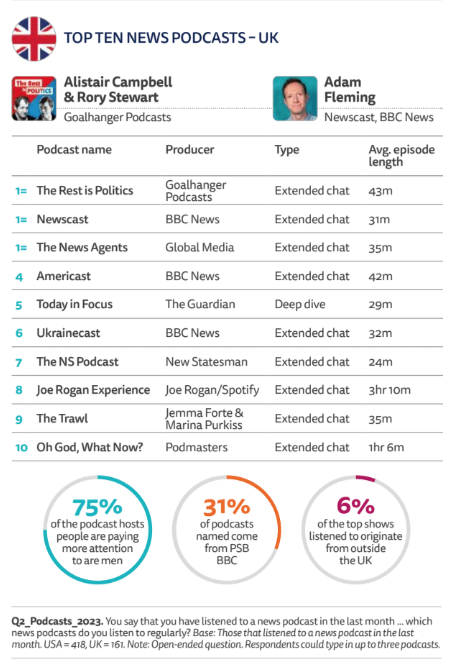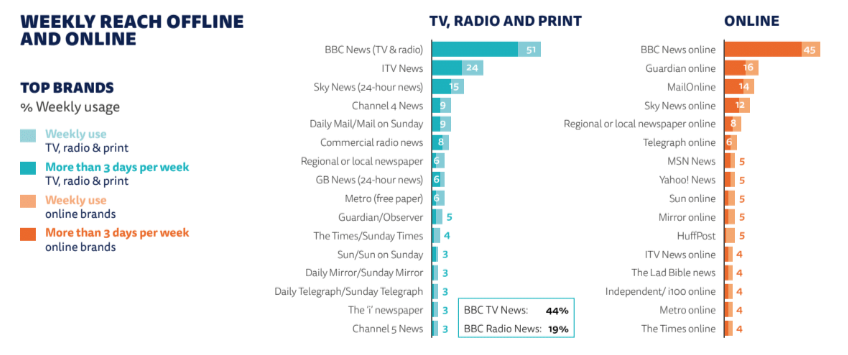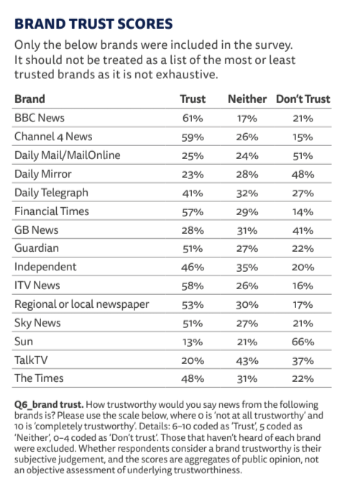
The annual Reuters Institute Digital News Report is the go-to research piece to understand the trends impacting news industries internationally and domestically.

On today's release of the 2023 report, Journalism.co.uk spoke to senior research associate and lead author, Nic Newman, about what has changed (or has not changed) in the UK since last year.
Paying for news at a standstill
Just nine per cent of Britons pay for the news, the same figure in 2022. UK news consumers are historically resistant to pay for the news because they are so used to getting it for free, and the cost of living crisis is not helping.
In the last year, one in six people cancelled a news subscription. Large swathes of audiences are encouraged to take up subscriptions through trials and offers, but leave as soon as the period ends and the price increases. Half, however, kept their subscriptions.

Screenshot: Reuters Institute Digital News Report 2023
News subscriptions alone were not seen as valuable enough for many, so many news organisations are enriching their bundles with anything from puzzles to greater website functionalities.
"It's a winner takes most market," says Newman. Three legacy titles in particular - Times Media, The Telegraph and The Guardian - enjoy long-standing habitual readership, and therefore a subscriber base that is unlikely to leave.
They are all successful in their own ways. But loyalty is the key for Times Media to command a high subscription price point (£26 per month) and The Guardian to succeed with a voluntary donation model.
The Telegraph has recently been put on sale, despite its operational profitability and growing subscriber base. Its recent acquisition of lifestyle publisher Chelsea Magazine has shades of New York Times' 2022 buyout of The Athletic, in a bid to find new readers.
Media companies like Times Media are eyeing up the US market because there are more paying consumers (21 per cent), but face stiff competition from domestic news organisations. Reader revenue-driven niche publications are emerging in the UK as a compelling alternative to the status quo, but this phenomenon considerably lags behind the US.
"All the UK media organisations that have reached the plateau are basically looking at other strategies now," says Newman.
A mixed picture in podcasting
Brits love podcasts - 30 per cent listen to at least one, up five percentage points from 2022 - but only eight per cent listen to a news podcast.
Podcasting has seen an explosion when all sorts of newcomers have entered the field, pitting news as a genre up against specialist subjects, lifestyle, contemporary life and sports.
British podcast listeners tend to stick with homemade shows - only one of the top 10 news podcasts (Joe Rogan Experience) is foreign. The News Agents by former BBC trio Emily Maitlis, Jon Sopel and Lewis Goodall has a hit with audiences, jumping to the joint top spot in its first year with fellow newcomer The Rest Is Politics by Goalhanger Podcasts and mainstay BBC News' Newscast.

Screenshot: Reuters Institute Digital News Report 2023
"Outside those big three, we see a huge amount of content and none of them get a lot of listeners which is partly the nature of podcasting," says Newman.
"Thereby hangs the challenge: unless you have a really big audience, it's very hard to monetise podcasts. That's where podcasting is for many about increasing loyalty, increasing the subscription bundle or selling live events."
Discovery remains the big hurdle for podcasts in general, but specific to news podcasts is the challenge of making serious topics enjoyable and digestible. Those who are successful mix up light entertainment with educational qualities.
The UK's top 10 list is dominated by extended chat shows, and one single deep dive show in The Guardian's Today In Focus. The US has a number of popular news round-up shows, where the UK does not have any. Documentary and investigative shows that have long been successful in the US, are now mushrooming up in the UK, particularly with ITV's Partygate podcast and various shows by Tortoise Media.
TikTok-ification of news
TikTok might not be in the top six platforms for news in the UK, but its impact on social media is clear to see. The UK, like most European countries, are typically older countries compared to those with the fastest-growing TikTok adoption (Peru, Thailand and Kenya).

Screenshot: Reuters Digital News Report 2023
Looking at the 18-24 demographic in the UK, 41 per cent say social media is now the main source of news for 41 per cent, up from 18 per cent in 2015. News organisations must continue to think about social presence, but social media platforms are increasingly taking inspiration from TikTok.
YouTube - the only growing platform as ten per cent of Britons use it for news - provides a good example in its short-form, vertical video player YouTube Shorts. Instagram Reels is another example of TikTok's influence on its rivals.
"It's not about TikTok per se, it's more about these trends towards native social, vertical video," says Newman.
BBC News launched on TikTok because of the Ukraine War after initial resistance but has come around in posting more generally.
Social media matters more as there is a generational gap around how news consumers find the news. Around a quarter of 18-24s are using news websites or apps as their first port of call, but that is around half of the over 35 demographic.
Staying power of the BBC
It has been a rough 12 months for the British public broadcaster, with sagas surrounding presenter Gary Lineker and chairman Richard Sharp raising questions about its independence and impartiality.
This has not really impacted the reach of the BBC, as it is miles ahead of the competition. It achieves more than double the weekly reach of its next competitors both offline (51 per cent) and online (45 per cent).

Screenshot: Reuters Institute Digital News Report 2023
"A lot of their appeal is to do with early-movers advantage and habit built up over many years," says Newman.
"There is a silent majority who use and enjoy the BBC, whereas there is a vocal minority who tend to be more politically committed and attack the BBC and the media in general."
It is perhaps not surprising as the broadcaster has built such a legacy. Its coverage around the Queen's death - viewed by some 22m people on television and streaming - is a testament to its enduring appeal.
In the UK, 36 per cent of 18-24s still think public service media is important, a figure which steadily increases with age, up to 51 per cent for over 55s.
As with all European broadcasters, its key challenges are around declining TV audiences and attracting younger viewers. Though BBC News has expanded into TikTok and podcasting, it does not enjoy the same dominance as it does elsewhere.
Three out of ten top news podcasts are from the BBC, where it might typically expect 50 per cent in radio. The joint top spot The News Agents is also led by three former BBC employees, illustrating another of its challenges around retaining its star reporters and presenters.
Trust has also not proved an issue, as the BBC sits top of the charts with a 61 per cent trust rating, in fact up six percentage points from 2022, despite controversies.
Broadcasters are the bookends of trust
Trust in the UK continues to fall as a third (33 per cent) say they trust the news 'most of the time' - one percentage point less than last year.
Interest in the news is plummeting, with 43 per cent of people who are 'very or extremely interested in the news', - this was 70 per cent in 2015. However, news avoidance is down five percentage points.
Public service broadcasters - BBC News, Channel 4 and ITV News - are the top three most trusted news sources. At the bottom end of the trust spectrum are a new kind of broadcasters in the American-style, opinion-led newcomers GB News (28 per cent) and Talk TV (20 per cent).

Screenshot: Reuters Institute Digital News Report 2023
In the case of GB News, it reaches six per cent of audiences weekly - a relatively high number, the same as the free daily newspaper Metro, and more than any other national newspaper.
"It's building an audience - but if you look at that audience, it's as you expect. Typically from the political right, older and male. Those people trust GB News, but if you ask everyone, they will have heard of it and got a view on it.
"It shows that, to an extent, British people have not endorsed partisan news broadly. The American model is still struggling in acceptance, both in reach and trust scores. On the other hand, it hasn't been going very long, so you can't say it won't work."
Only The Sun scores worse for trust, once again sitting rock bottom at 13 per cent. Other tabloids fare similarly, with The Mirror (23 per cent) and The Daily Mail/Mail Online (25 per cent) in close company.
Free daily newsletter
If you like our news and feature articles, you can sign up to receive our free daily (Mon-Fri) email newsletter (mobile friendly).
Related articles
- Six noteworthy initiatives we saw in the media industry this month
- How are news organisations covering the UK's general election 2024?
- RISJ Digital News Report 2024: User needs with Vogue and The Conversation
- RISJ Digital News Report 2024: Three essential points for your newsroom
- RISJ Digital News Report 2024: Five trends to watch in the UK









